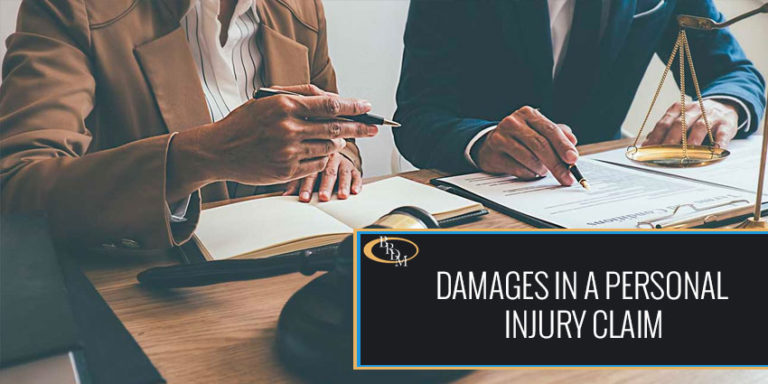If you or a loved one suffered a personal injury or developed a permanent disability due to someone else’s negligence, you can claim damages. Such a claim is called a personal injury claim.
Table of Contents
- What Are Personal Injury Damages?
- Are There Different Types of Personal Injury Damages?
- Proving Negligence to Receive Damage Compensation
- The Three Types of Damages You Can Recover in a Personal Injury Claim
- What Types of Injuries Are Common in Personal Injury Claims?
- Do I Need Medical Records to Claim Personal Injury Damages?
- How Long Do Personal Injury Claims Usually Take?
- Am I Entitled to Claim Damages on Behalf of a Loved One Who Died in an Accident?
- Is There a Time Limit for Me to Start a Personal Injury Claim?
- Call a Florida Personal Injury Lawyer Today
What Are Personal Injury Damages?
Damages in a personal injury claim refer to compensation in the form of payment that the injured victim can receive. Financial awards usually come about from a successful personal injury claim. So, if you were unfortunate enough to sustain injuries in a car, motorcycle, pedestrian, or golf cart accident, you might be entitled to secure personal injury damages.
Car accident claims are the most common type of personal injury claim. However, personal injury claims for damage compensation are also used for the following:
- Medical malpractice
- Dog bites
- Negligent security
- Slip and fall accidents
- Construction accidents
- Burn injuries
- Product liability
- And more
Are There Different Types of Personal Injury Damages?
Yes. Personal injury damages can fall under three categories: economic, non-economic, and punitive. Economic damages are also known as special damages, while non-economic damages are known as general damages.
In personal injury cases where the basis of the claim is negligence, the claimant may win a financial award, including economic and non-economic damages. On the other hand, punitive damages are rarely awarded in Florida. They are only relevant if the defendant acted maliciously and recklessly while committing a crime against you to cause your injuries.
Proving Negligence to Receive Damage Compensation
If you are the victim seeking compensation, you will need to prove the other party’s negligence. However, the defendant does not need to prove anything; they simply deny liability.
Claimants bring a claim against the negligent party or insurer to seek compensation for their losses and injuries. To fully understand the value of their claim, they must understand what types of damages are available. An experienced attorney will know what damages you can seek and how to prove them. You’ll also have better odds of winning your case and getting fair compensation for your losses.
In addition, a lawyer can help you determine a fair value for your damage claim. It’s difficult to quantify losses that don’t have a price tag, like non-economic damages. Without the expertise of a legal professional, it could be a daunting process for you to calculate the total cost and value of your damages. Furthermore, an attorney will help ensure you get the maximum compensation possible for your losses.
First, however, you must establish negligence before seeking compensation. Negligence is when a person fails to act reasonably and prudently to avoid causing harm to others. Then, as the injury victim or claimant, you must prove that the defendant was negligent. That involves proving that they owed you a duty of care and breached that duty of care, leading to your injuries.
The Three Types of Damages You Can Recover in a Personal Injury Claim
An injury victim may seek three types of claims in a settlement: economic, non-economic, or punitive. Here are examples of each.
Economic Damages
Economic damages are meant to help the plaintiff or injury victim with financial burdens. Also called “special damages,” economic damages are often awarded to cover the financial losses associated with accident injuries.
Economic damages are fairly easy to calculate since they involve adding up expenses with a set value. Or, a jury might award economic damages based on the fair market value. Examples of economic damages include:
- Medical bills
- Lost income and wages
- Property damage
- Rehabilitation or physical therapy
- Any costs affiliated with living with a disability, such as house or car accommodations
- Funeral and burial costs if a loved one passes away
- Prescription medication
- Travel to doctors’ appointments
Non-economic Damages
Non-economic damages are more challenging to quantify with a monetary value. Also known as general damages, non-economic damages deal with general pain and suffering. They are less tangible than economic damages and, therefore, have subjective costs. Additionally, general losses include any further damages the plaintiff will likely suffer. For example, future medical care would be an example of non-economic damages.
Other examples of non-economic damages include:
- Reduced quality of life
- Mental anguish
- Pain and suffering
- Loss of consortium
- loss of congenial employment
- Lost earning capacity
- Lost future earnings
- Tarnished reputation
In addition to general damages lacking “price tags,” they are trickier to determine the value for other reasons. For example, you have to consider the injury victim’s age, occupation, income, and the severity of their injuries. There are many circumstances to consider when assessing the value of non-economic damages.
Insurance companies are usually more likely and cooperative in awarding economic damages since they are specific. For example, you can bring hard copies of medical expenses from hospital invoices with exact numbers. But non-economic damages are more subjective and thus more difficult to evaluate in a personal injury claim.
Punitive Damages
Punitive damages are meant to deter the defendant from repeating criminal conduct. However, punitive damages are not granted often in Florida. For a plaintiff to win punitive damages, the defendant must have acted recklessly and maliciously.
What Types of Injuries Are Common in Personal Injury Claims?
A person can sustain any degree of injury and have a valid personal injury claim. However, more severe and substantial injuries usually equate to higher compensation.
Common injuries involved in personal injury claims include:
- Broken bones
- Traumatic brain injuries (TBI)
- Burn injuries
- Internal injuries
- And more
Traumatic injuries can change a person’s entire life and affect their family members. Sadly, dealing with the aftermath of catastrophic traumatic injuries is not easy for anyone. One of the hardest hits injury victims take is the financial burden. However, by enlisting the help of an experienced Florida personal injury lawyer, you can get compensation to help you deal with all of your accident expenses.
Do I Need Medical Records to Claim Personal Injury Damages?
Yes. Medical records will help you calculate economic losses. Additionally, they will support your claims for non-economic damages like pain and suffering.
How Long Do Personal Injury Claims Usually Take?
Since each personal injury case has unique circumstances, it will vary by case. For example, some personal injury cases take months to settle, while other, more complex cases could take years. However, no matter what kind of case you have, we will do everything in our power to get your claim settled in a timely manner and with the best possible outcome.
Am I Entitled to Claim Damages on Behalf of a Loved One Who Died in an Accident?
If a loved one or family member’s life was lost in an accident or sustained serious injuries that led to their death, you may have grounds for a wrongful death claim. For instance, if your loved one died in a crash that a drunk driver caused, you might be entitled to file a claim for wrongful death.
Is There a Time Limit for Me to Start a Personal Injury Claim?
Yes. Florida does have a statute of limitations for personal injury claims. That means you have a time limit to take action after the accident. For negligence-based personal injury claims
(such as car accidents), the limit is four years from the date of the accident. Or four years from the discovery of injuries. For claims not based on negligence, the time limit is two years.
Call a Florida Personal Injury Lawyer Today
With the support of legal experts, you can get the maximum compensation possible and hold all liable parties accountable. Whether you are in the claims process or thinking about starting one, we can help make your experience easier. What’s more, while you let us handle your case, you can dedicate your energy to healing and recovering from injuries.
We’ll review your case and answer any questions about your claim and getting the compensation you deserve. Then, if we decide to take your case, we will get straight to work on building your case and keep you informed through every stage of the process.
Since we offer a free initial consultation, don’t hesitate to call us today.



